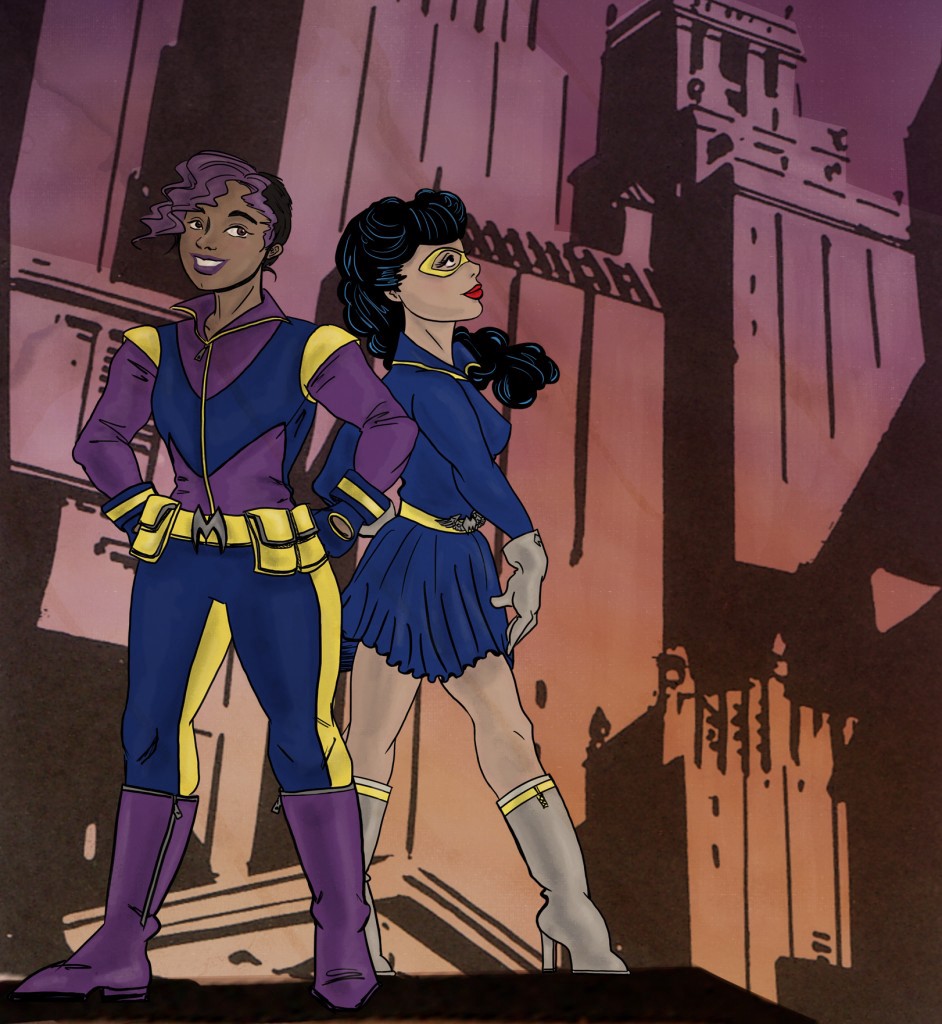Meeting Ms. Meta: A Female Superhero That You Create
Tuesday, December 8, 2015
By Engagement Lab
10/21/2015

The reality is often different from what is presented. Movies, games, and even column writers provide their audiences with stories that aren’t true to their origin. Case in point: Stonewall, and its whitewashing; Ridley Scott’s movies, and his Caucasian Egyptians; the assassins in Assassin’s Creed, and their supposedly altruistic nature.[i] So rather than continue with the inaccuracies and promotions of stereotypical characters, Ms. Meta’s creator Sarah Zaidan wishes to obliterate all of that.
“The Adventures of Ms. Meta” will be a female superhero game that is an experience; fueled by the need to live through a time period, rather than just get to the goals. A game designed to help you learn. Imagine being able to live through a time period, not only as a character, but as a personality that resonates with the player. Inhabit her role, play along the time, wear their clothes, and debunk the common myths surrounding people then.
The title comes from both metamorphosis and meta-textual, “and meta as in breaking the 4th wall,” Zaidan said. The game contains POC characters, historically accurate stories, and the opportunity to be able to create — and play — as your own character. “You can create your character to be a person of color,” Zaidan said. There will be dialog options, circumstances that are dependent on your character’s ethnicity, and scenarios true to their history.
Sarah Zaidan — an illustrator, a game designer, and a fellow at Engagement Lab — knows that background information matters a lot here. “I am committed,” she said, “I am collecting resources on this as we speak.” The characters will have many facets, and not just one skin color. They will interact with side characters from behind the scenes.
The Accuracy:
To maintain the correctness, Zaidan plans on beta testing the game with people of color; something she also did for the collaborative superhero comic she is a part of (My So-Called Secret Identity). Ms. Meta will abstain from having stereotypical characters, their stories will not be “…a white person’s interpretations of what this POC’s background or experiences are like.” Zaidan wants to involve people who’ve had the experiences required to create this game. “It’s not to say that I believe that you can’t tell an authentic story about someone who doesn’t have your experiences,” she said, “but it helps to be able to allow those voices to tell their stories without the filter of being used as a research resource by someone.
The Design:
Zaidan is working out the mechanics and making prototypes. “My character creation system right now looks like paper dolls,” she said, “but it gets the job done.” Currently, Zaidan is working on making the visuals, “I’m grateful that my original training is as an artist,” she said. She will also design the UI and the UX. Each decade represented will reflect the design of comics from that time. Zaidan’s experience as a professor of games classes comes handy — by going through the teaching process of mechanics and gameplay, her own teachings get reinforced. She remembers “how to balance the game, how to avoid the game only being fun to win but not fun to play.”
The Action:
Currently, Ms. Meta has funding for the first decade. The prologue, which will be set in the present day, will have a tutorial level to get the player familiar with the game’s mechanics. Zaidan wants to give the players of this game an experience similar to that of Arkham Knight. The players will be able to create the female superhero that they desire, “but perhaps not through as many different modes of gameplay.” By not being restricted in options for characters, the game will allow the player to have a vivid experience. “And like Valiant Hearts,” Zaidan said, “it aims to make you care about the NPCs (non-player characters).”
The Future:
Zaidan knows that every player has a different reason to play the game. The aesthetic, the game type, the puzzle, or even the concept. Here, the concept is superheroes. “Superheroes are everywhere,” she said. While 2015 saw the release of Batman: Arkham Knight, and Deadpool (scheduled for re-release on PS4 and Xbox One in November),[ii] the next two years will have at least 15 superhero movies. The audience is, slowly but most certainly, changing their view regarding female superheroes.
Recently, on the Star Wars’ Facebook page, a fan named Seth Grove submitted his rendition of the new female character “Captain Phasma.” When another person commented that he could hardly recognize if that was female armor at all, the Star Wars Facebook rep responded by saying, “It’s armor. On a woman. It doesn’t have to look feminine.”[iii Elsewhere, at University of Delaware, findings of researcher Rachael Hutchinson confirmed that the young players today do notice the sexist undertones that the female protagonists go through.[iv] Zaidan, with the help of Ms. Meta, aims to bridge that gap for them and highlight the importance of female superheroes.
[i] Mikel Reparaz, “The Top 7… Historically Inaccurate Historical Games,” Games Radar, September 12, 2011, http://www.gamesradar.com/top-7-historically-inaccurate-historical-games/.
[ii] Eddie Makuch, “Xbox One/PlayStation 4 Getting Deadpool Re-Release,”Gamespot, August 31, 2015, http://www.gamespot.com/articles/xbox-oneplaystation-4-getting-deadpool-re-release/1100-6430206/.
[iii] Lauren Hockenson, “Star Wars Masterfully Shuts Down This Sexist Question About Storm Trooper Armor,” TNW News, August 29, 2015, http://thenextweb.com/shareables/2015/08/29/star-wars-masterfully-shuts-down-this-sexist-question-about-storm-trooper-armor/.
[iv] Rachael Hutchinson, “Gender Stereotypes in Japanese Fighting Games: Effects On Identification and Immersion,” The Journal of New Media & Culture 10 (1).